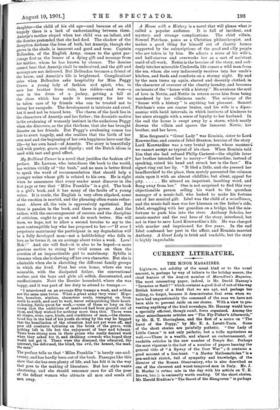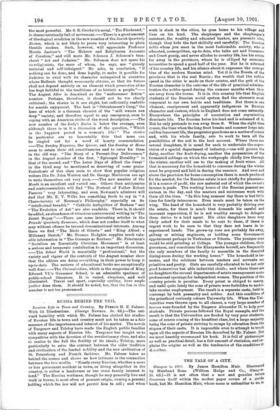C URRENT LITERATURE.
THE MINOR MAGAZINES.
Lightness, not solidity of the usual kind or to the usual amount, is, perhaps by way of tribute to the holiday season, the chief feature of the Augast number of Macmillan's Magasins. The most interesting paper, indeed, is Mr. David Hannay's "Invasion or Raid ?" which contains a good deal of out-of-the-way British history of a kind that we are apt, and perhaps too willing, to forget, because it demonstrates that even when we have had unquestionably the command of the seas we have not been able to prevent raids on our shores. With a view to pre- venting anything of the kind nowadays, Mr. Hannay would have a specially efficient, though small, force organised. Among the other miscellaneous articles are "The Fly-Fisher's Aftermath," by Mr. H. T. Sheringham, and • the first of a series on "The Land of • the Poppy," by Mr.. E. A. Levett-Yeats. Some of the short stories are painfully pathetic. "Oar Lady of Little Canon" is not only pathetic, but a trifle mysterious as well.—There is a wealth, and almost an embarrassment, of readable articles in the new number of Temple Bar. Perhaps the most vigorous is the last of a number cf papers bearing the general title of "A Byway of the Boer War" ; it contains a good account of a lion-hunt. "A Master Mathematician" is a pen-and-ink sketch, fall of sympathy and knowledge, of the director of the. Roman Observatory, who is also described as one of the cleverest and worst-tempered men in Italy. Mr. J. R. Motley is rather late in the day with his article on T. E. Brown, but Li-, is eminently worth reading. Of the short stories, Mr. Harold Bindloss's "The Secret of the Mangroves " is perhaps the most powerful. Mr. S. R. Crockett's serial. "The Firebrand," is characteristically full of movement.—There is a great amount of theological erudition in the new number of the Jewish Quarterly Review, which is not likely to prove very interesting to plain Gentile readers. Such, however, will appreciate Professor Morris Jastrow's " The Hebrew and Babylonian Accounts of Creation," and still more Mr. Solomon J. Solomon's tren- chant " Art and Judaism." Mr. Solomon does not spare his co-religionists, the mass of whom, he says, are " grossly material and self-indulgent." He asks, in conclusion, "if nothing can be done, and done legally, to make it possible for Judaism to exist with its character unimpaired in countries where Hellenic thought necessarily obtains, so that its future shall not depend entirely on an element which persecution alone has kept faithful to the traditions of so historic a people."— The August Idler is described as the "midsummer fiction" number. Perhaps, therefore, it should not be too closely criticised ; the stories in it are slight, but sufficiently readable for seaside enjoyment. The best is " Ottenhausen'a Coup," the hero of which is a German chemist of the " still waters run deep" variety, and therefore equal to any emergency, even to coping with an American strike of the worst description.—The new number of the Lady's Realm is below the average, even although there is in it a discussion of the question, " Which is the happiest period in a woman's life ? " The stories in particular are so lamentably thin that none can be singled out for a word of hearty commendation —The Sunday Magazine, the Quiver, and the Sunday at Home seem to retain their old constituencies and to cater for them in the old way. "The Story of a Present-Day Deliverance" in the August number of the first, " Episcopal Heraldry " in that of the second, and "The Later Days of Alfred the Great" in the third may be mentioned as deserving of some praise. Periodicals of this class seem to show that popular religious writers like Dr. John Watson and Dr. George Mathieson are apt to write themselves out very soon.—The new number of the Month is an excellent and varied one. Others than antiquaries and controversialists will find "The Portrait of Father Robert Parsons " very interesting, and even Newman's admirers will find that Mr. E. V. Wilks has something fresh to say in "A Characteristic of Newman's Philosophy," especially on its "intellectual breadth." " Catholic Antiquities of Bosham " and "The Evolution of Art" are also readable. There is, it should be added, an abundance of vivacious controversial writing in "The Jesuit Bogey."—There are some interesting articles in the Friends' Quarterly Examiner, which does not confine itself to what may without offence be termed denominational interests. Among these we find " The Birds of Siberia " and " King Alfred : a Millenary Sketch." Mr. Thomas Hodgkin supplies much valu- able information in "The Gurneys as Bankers." Mr. Priestman's " Socialism an Essentially Christian Movement " is at least a serious and temperate contribution to an important discussion. —The School World is essentially "professional," but the variety and vigour of the contents of the August number show that the editors are doing everything in their power to keep it up-to-date. The reviews of educational books are exceptionally well done.—The Cheimsfordian, which is the magazine of King Edward VI.'s Grammar School, is an admirable specimen of public-school literature. It is varied, vivacious, and well illustrated. Travel and sport, especially cycling, have ample justice done them. It should be noted, too, that the fun in this nutober is not too pronounced.



































 Previous page
Previous page